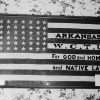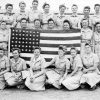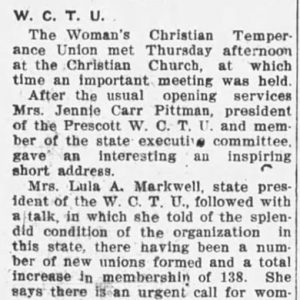calsfoundation@cals.org
Jennie Carr Pittman (1858–1938)
Jennie Carr Pittman was one of Arkansas’s most prominent and influential figures in the campaign to secure the prohibition of alcohol in the United States. A major force in the Woman’s Christian Temperance Union (WCTU), the nation’s largest temperance organization, she played a substantive role—at both the state and national level—in the group’s ultimately successful effort to help enact the Eighteenth Amendment.
Jennie Carr was born on December 26, 1858 (some sources have it as 1856), in Fredonia—later called Biscoe (Prairie County)—to Charles Turner Carr and his second wife, Susan Wesley Capehart Carr. Not much is known about her youth. While she was christened Mildred Jane, she later went by the name Jennie Mildred Carr until her marriage. On her birthday in 1875, she married John Marshall Pittman. The couple had seven children.
She became active in the temperance movement early and continued to be involved well after the enactment in 1920 of the Eighteenth Amendment to the Constitution, which ushered in the era of prohibition in America. She served at various times as president and corresponding secretary of the Woman’s Christian Temperance Union of Arkansas. In addition, she was at one point the editor of the Arkansas White Ribboner, the publication of the state’s WCTU branch. She also served on the national WCTU board.
She exhibited a passion and determination that made her a much admired figure in the field. One newspaper reported that at one of her public appearances, she offered “her usual clever enlightening talk about the gratifying results of the W.C.T.U. work, telling of some of her pleasant experiences attending both national and state gatherings.” Such a personal approach, one made even stronger by her daughter often accompanying her, enabled Pittman to expand her influence and effectiveness. At the same time, she was once reported to have said that a return to Carry Nation’s axe-wielding approach might be necessary to achieve the WCTU’s goals.
Pittman organized independent local groups—at one point, she reported to the national organization that the state had over 100 such groups—that worked to put pressure on the Arkansas General Assembly to enact a statewide ban on alcohol. She also sought to expand the temperance efforts as widely as possible; despite segregation in Arkansas, there was an active African-American effort, and its leaders communicated with Pittman and gave her information that she included in the report she submitted as the state corresponding secretary for the national WCTU. Pittman often worked with Lulu Markwell, who was president of the Arkansas chapter of the WCTU in the 1910s and eventually the first Imperial Commander for the national Women of the Ku Klux Klan (WKKK) organization, a group she perceived as a continuation of the reform efforts she had pursued as a WCTU leader.
In contrast, Pittman’s devotion to the cause of temperance did not end with the enactment of the Eighteenth Amendment. Indeed, when in April 1920, shortly after prohibition went into effect, Pittman triumphantly attended the World WCTU Convention in London, England, she included some sightseeing and outreach on the trip aimed at inspiring the international community to follow the American lead.
Pittman continued to advocate on behalf of the temperance movement and groomed her daughter as a next-generation activist. In 1932, as pressure grew to repeal the Eighteenth Amendment, Pittman, at that time serving as the editor the White Ribboner, issued a public warning declaring that WCTU members would once again resort to hatchets and violence rather than see a revival of legalized alcohol. She said the WCTU would blockade streets and stop and destroy liquor trucks if the national ban were to end.
Ultimately, however, by the time the Twenty-First Amendment repealed the Eighteenth Amendment in December 1933, the nation was mired in the Great Depression, and the national response to the change was more one of national sigh of relief than outrage. Efforts would continue to keep Arkansas dry, but they were met with limited success as decisions were made on a county-by-county basis.
Pittman died on November 6, 1938, in Prescott (Nevada County). She is buried in De Ann Cemetery in Prescott.
For additional information:
“Jennie Carr Pittman.” Find-a-Grave. https://www.findagrave.com/cgi-bin/fg.cgi?page=gr&GRid=8446617 (accessed November 2, 2017).
National Woman’s Christian Temperance Union Report of the Thirty-Fifth Annual Convention, Denver, Colorado, October 23 to 28, 1908. Woman’s Temperance Publishing Association, 1908.
William H. Pruden III
Ravenscroft School









Comments
No comments on this entry yet.